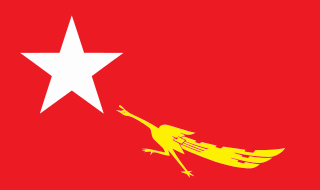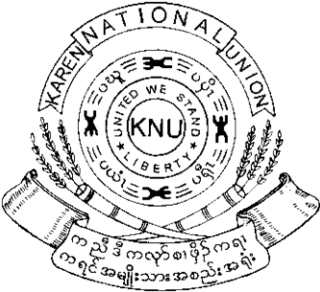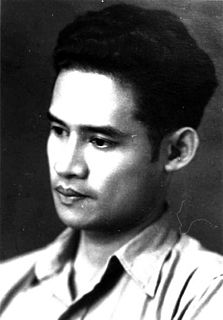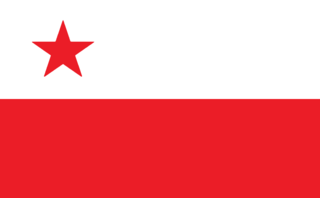
Myanmar is a unitary parliamentary republic under its constitution of 2008. The Economist Intelligence Unit has rated Myanmar as "hybrid regime" in 2016. The military of Burma holds a large amount of power in the government, despite the end of the last Burmese military dictatorship.

The National League for Democracy is a social-democratic and liberal democratic political party in Myanmar (Burma), currently serving as the governing party. Founded on 27 September 1988, it has become one of the most influential parties in Myanmar's pro-democracy movement. Aung San Suu Kyi, the Special Honorary President of the Socialist International and a Nobel Peace Prize laureate, serves as its President and she is currently serving as State Counsellor of Myanmar. The party won a substantial parliamentary majority in the 1990 Burmese general election. However, the ruling military junta refused to recognise the result. On 6 May 2010, the party was declared illegal and ordered to be disbanded by the junta after refusing to register for the elections slated for November 2010. In November 2011, the NLD announced its intention to register as a political party to contend future elections, and Myanmar's Union Election Commission approved their application for registration on 13 December 2011.

The Karen National Union is a political organisation with an armed wing, the Karen National Liberation Army (KNLA), that claims to represent the Karen people of Myanmar (Burma). It operates in mountainous eastern Myanmar, and has underground networks in other areas of Myanmar where Karen people live as a minority group. In the Karen language, this area is called Kawthoolei. Some of the Karen, led primarily by the Karen National Union (KNU), have waged a war against the central government since early 1949. The aim of the KNU at first was independence. Since 1976 the armed group has called for a federal system rather than an independent Karen State.

The Karen National Liberation Army is the military branch of the Karen National Union (KNU), which campaigns for the self-determination of the Karen people of Myanmar. The KNLA has been fighting the Burmese government since 1949.

Saw Ba U Gyi was the first President of the Karen National Union. Ba U Gyi graduated with a bachelor's degree from Rangoon University in 1925 and studied law in England, passing the English bar in 1927. From 1937 to 1939, he served as the Minister of Revenue of British Burma, and from February to April 1947, as the Minister for Transport and Communications of Burma. He was killed in an ambush by the Burmese Army on 12 August 1950.

The Kurdistan Parliament, also called the Iraqi Kurdistan Parliament (IKP), is the parliament of Iraqi Kurdistan. It is made up of representatives from the various parties, lists or slates that are elected every four years by the inhabitants of the provinces of Iraqi Kurdistan currently governed by the Kurdistan Regional Government. Prior to the Kurdistan Election Law passed in March 2009, the body was referred to as the Kurdistan National Assembly.

The internal conflict in Myanmar is a series of primarily ethnic conflicts within Myanmar that began shortly after the country, then known as Burma, became independent from the United Kingdom in 1948. The conflict is the world's longest ongoing civil war.

General elections were held in Burma over several months between June 1951 and April 1952 due to internal conflict within the country.

The Karen conflict is an armed conflict in Kayin State, Myanmar. The conflict has been described as one of the world's "longest running civil wars".

The Karen National Party is a political party in Myanmar (Burma). The party was registered on 24 October 2014. Despite being based in Yangon, the party only contested constituencies in Kayin State in the 2015 general election. After the government relaxed naming rules in 2012, the party changed its name from the then government approved "Kayin" National Party to the Karen National Party.
The Phalon-Sawaw Democratic Party, also spelled Phlone-Sqaw Democratic Party, is a Karen political party in Myanmar.

The Union Karen League was a political party in Burma led by Win Maung.

The Patriotic Old Comrades' League was a political party in Myanmar.

The Arakan Liberation Party is a Rakhine political party in Myanmar (Burma). The party has an armed wing, the Arakan Liberation Army (ALA), which has 60–100 personnel. The ALA signed a ceasefire agreement with the government of Myanmar on 5 April 2012 and became a signatory of the Nationwide Ceasefire Agreement (NCA) on 15 October 2015.

The Kuki National Army is a Kuki insurgent group active in Northeast India and northwest Myanmar. It is the armed wing of the Kuki National Organisation.















